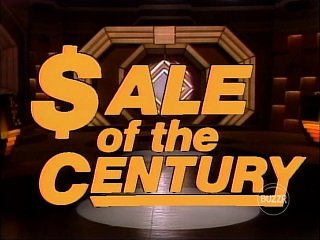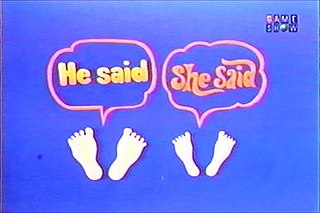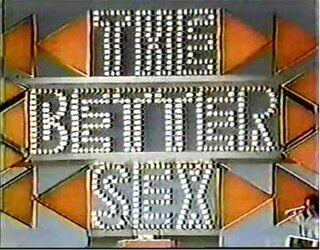
Hollywood Squares is an American game show in which two contestants compete in a game of tic-tac-toe to win cash and prizes. The show piloted on NBC in 1965 and the regular series debuted in 1966 on the same network. The board for the game is a 3 × 3 vertical stack of open-faced cubes, each occupied by a celebrity seated at a desk and facing the contestants. The stars are asked questions by the host and the contestants judge the truth of their answers to gain squares in the right pattern to win the game.

Match Game is an American television panel game show that premiered on NBC in 1962 and has been revived several times over the course of the last six decades. The game features contestants trying to match answers given by celebrity panelists to fill-in-the-blank questions. Beginning with the CBS run of the 1970s, the questions are often formed as humorous double entendres.

Eye Guess was an American game show created by Bob Stewart and hosted by Bill Cullen, which aired on NBC from January 3, 1966, to September 26, 1969. The game combined a general knowledge quiz with a Concentration-style memory element, where the answers were shown to the players and their recall of their positions was tested.

Password is an American television game show in which two teams, each composed of a celebrity player and a contestant, attempt to convey mystery words to each other using only single-word clues, in order to win cash prizes.

Sale of the Century is an American television game show that originally debuted on September 29, 1969, on NBC daytime. It was one of three NBC game shows to premiere on that date, the other two being the short-lived game shows Letters to Laugh-In and Name Droppers. The series aired until July 13, 1973, and a weekly syndicated series began that fall and ran for one season.

Chain Reaction is an American television game show created by Bob Stewart, in which players compete to form chains composed of two-word phrases.
Time Machine is an American game show where contestants compete to answer trivia questions about popular culture and recent history to win prizes. The show aired on NBC from January 7 through April 26, 1985, and was hosted by John Davidson. Charlie Tuna was the announcer, with Rich Jeffries as his substitute. Reg Grundy Productions produced the series, and upon its premiere Time Machine was one of three Grundy series airing on NBC.

The Match Game-Hollywood Squares Hour is an American television panel game show that combined two panel games of the 1960s and 1970s – Match Game and Hollywood Squares – into an hour-long format.

He Said, She Said was an American game show hosted by Joe Garagiola, with Bill Cullen occasionally filling in when Garagiola was covering baseball games. The show, which asked couples questions about their personal lives, aired in syndication during the 1969-1970 season, and was taped at NBC Studios in New York City.

Wordplay is an American game show which ran on NBC from December 29, 1986 to September 4, 1987. It was hosted by Tom Kennedy, with Jamie Farr substituting for Kennedy for one week of shows, and announced by Charlie O'Donnell. The show was produced by Scotti Bros.-Syd Vinnedge Television in association with Fiedler/Berlin Productions and Rick Ambrose Television.

Talk About is a game show produced in Canada by CBC Television, which bears some similarities to the board game Outburst. Originally produced by CBC for the 1988–89 season, it was later picked up for American television syndication, airing from September 18, 1989, to March 16, 1990, with repeats later airing on the USA Network from June 28 to December 31, 1993; on GameTV from January 3, 2011, to September 2015; from July 1, 2019, to September 12, 2021; and since February 28, 2022; and on Buzzr starting May 30, 2022. Taped at stage 40 at the CBC Vancouver studios via local station CBUT in Vancouver, British Columbia, the show was hosted by Wayne Cox with local radio personality Dean Hill as announcer, while Doc Harris filled in for Hill during Season 1.

The Better Sex is a television game show in the United States where men competed against women in a "battle of the sexes" format. The Mark Goodson-Bill Todman production ran on ABC from July 18, 1977, to January 13, 1978. The show had two hosts, one male and one female; each acted as leader of a team of the appropriate sex. The male host was Bill Anderson and the female host was Sarah Purcell. Gene Wood was the announcer.
Scattergories is an American game show on NBC daytime hosted by Dick Clark, with Charlie Tuna as announcer, that aired from January 18 to June 11, 1993. The show, which was adapted from the Milton Bradley board game of the same name, was produced by Reg Grundy Productions and was the second to last American game show to be produced by the company.

You Don't Say! is an American television game show that had three separate runs on television. The first version aired on NBC daytime from April 1, 1963, to September 26, 1969, with revivals on ABC in 1975 and in syndication from 1978 to 1979. The last two incarnations were executive produced by Ralph Andrews and produced and directed by Bill Carruthers.
Sale of the Century is an Australian prime time game show that aired on the Nine Network from 14 July 1980 to 29 November 2001. It is based on both Great Temptation that aired from 1970 to 1974 and on the original Sale that first aired in the United States from 1969 to 1973. The Australian format of Sale has since been used internationally, including in a revived US version that aired from 1983 to 1989.
Get the Message is a television game show produced by Mark Goodson and Bill Todman which aired on ABC's daytime schedule for nine months in 1964.

Showoffs is an American television game show which ran on ABC from June 30 to December 26, 1975. Bobby Van was host, with Gene Wood as announcer. The Mark Goodson-Bill Todman production involved two teams competing in a game of charades.

Password Plus and Super Password are American TV game shows that aired separately between 1979 and 1989. Both shows were revivals of Password, which originally ran from 1961 to 1975 in various incarnations. With only subtle differences between them, both Password Plus and Super Password retained the format of play as their predecessor, with two teams of two people each—a celebrity and a contestant—attempting to guess a mystery word using only one-word clues. A new feature included a series of five passwords as clues to an overarching puzzle for the teams to solve.

Blockbusters is an American game show, created by Steve Ryan for Mark Goodson-Bill Todman Productions, which had two separate runs in the 1980s. On this program, contestants answered general-knowledge questions to complete a path across or down a game board composed of hexagons. The first series of the show debuted on NBC on October 27, 1980, and aired until April 23, 1982. In the first series, a team of two family members competed against a solo contestant. Blockbusters was revived on NBC from January 5 to May 1, 1987, but featured only two solo contestants competing.

Three for the Money is an American game show produced by Stefan Hatos-Monty Hall Productions that aired on NBC from September 29 to November 28, 1975. Dick Enberg was the host with Jack Clark announcing. Enberg was also hosting Sports Challenge at the time and had just joined NBC's sports division.















